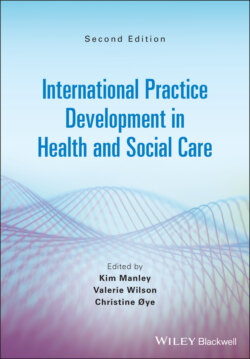Читать книгу International Practice Development in Health and Social Care - Группа авторов - Страница 36
References
Оглавление1 Barbour, A. (1995). Caring for Patients: A Critique of the Medical Model. Stanford, CA: Stanford University Press.
2 Bedwell, W., Wildman, J., Diaz Granados, D. et al. (2012). Collaboration at work: an integrative multilevel conceptualization. Human Resource Management Review 22 (2): 128–145.
3 Bradd, P., Travaglia, J. and Hayen, A. (2017). Practice development and allied health – a review of the literature. International Practice Development Journal 7 (2): 1–25.
4 Cameron, J., Hart, A., Brooker, S., Neale, P. et al. (2018). Collaboration in the design and delivery of a mental health Recovery College course: experiences of students and tutors. Journal of Mental Health 27 (4): 374–381.
5 Collier, A. (2016). Practice development using video‐reflexive ethnography: promoting safe space(s) towards the end of life in hospital. International Practice Development Journal 6 (1): 1–16.
6 Eriksen, K.Å. and Storesund, C.V. (2019). Nøkkelen er likeverd – Recoverykursleiarar sine erfaringar med samskaping. Tidsskrift for psykisk helsearbeid 16 (4): 237–247.
7 Gray‐Burrows, K., Willis, T., Foy, R. et al. (2018). Role of patient and public involvement in implementation research: a consensus study. BMJ Quality and Safety 27 (10): 858–864.
8 Gumuchian, S.T., Delisle, V.C., Kwakkenbos, L. et al. (2019). Reasons for attending support groups and organizational preferences: the European scleroderma support group members survey. Disability and Rehabilitation 41 (8): 974–982.
9 Hall, A., Bryant, J., Sanson‐Fisher, R. et al. (2018). Consumer input into health care: time for a new, active and comprehensive model for consumer involvement. Health Expectations 21 (4): 707–713.
10 Heggdal, K. (2015). ‘We experienced a lack of tools for strengthening coping and health in encounters with patients with chronic illness’: bridging theory and practice through formative research. International Practice Development Journal 5 (2): 1–16.
11 King, T. and Meddings, S. (2019). Survey identifying commonality across international Recovery Colleges. Mental Health and Social Inclusion 23 (3): 121–128.
12 Leamy, M., Bird, V., Le Boutillier, C. et al. (2011). Conceptual framework for personal recovery in mental health: systematic review and narrative synthesis. The British Journal of Psychiatry 199 (6): 445–452.
13 Nilsen, E.S., Myrhaug, H.T., Johansen, M. et al. (2006). Methods of consumer involvement in developing healthcare policy and research, clinical practice guidelines and patient information material. Cochrane Database of Systematic Reviews 3. https://doi.org/10.1002/14651858.CD004563.pub2
14 Ocloo, J. and Matthews, R. (2016). From tokenism to empowerment: progressing patient and public involvement in healthcare improvement. BMJ Quality and Safety 25 (8): 626–632.
15 Olasij, M., Cross, W., Reed, F. et al. (2019). Mental health nurses' attitudes towards consumer involvement in nursing handover pre and post an educational implementation. International Journal of Mental Health Nursing 28 (5): 1198–1208.
16 Perkins, R., Repper, J., Rinaldi, M. et al. (2012). Recovery colleges. Implementing recovery through organisational change. London: Centre for Mental Health. https://www.merseycare.nhs.uk/media/1208/1recovery‐colleges.pdf
17 Ramsey, I., Corsini, N., Peters, M. et al. (2017). A rapid review of consumer health information needs and preferences. Patient Education and Counselling 100: 1634–1642.
18 Renedo, A., Marston, C., Spyridonidis, D. et al. (2015). Patient and public involvement in healthcare quality improvement: how organisations can help patients and professionals to collaborate. Public Management Review 17 (1): 17–34.
19 Smith, J. and Dransfield, A. (2019). Patient and carer involvement in healthcare education, service delivery and research: avoiding tokenism. Evidence Based Nursing 22 (3): 65–66.
20 World Health Organization. (2015). WHO global strategy on people‐centred and integrated health services Interim Report. Geneva: World Health Organization.
